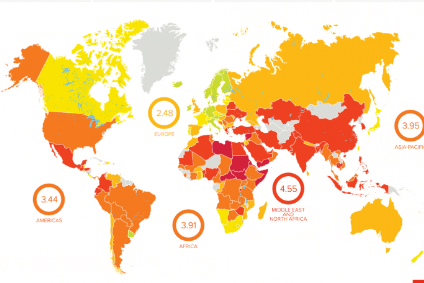
An annual survey of violations of human and trade union rights ranks key apparel-producing nations including Bangladesh, Cambodia, Colombia, Egypt, Guatemala, the Philippines and Turkey among the ten worst countries in the world for worker rights.
But year-on-year improvements have been seen in countries including Myanmar, Vietnam, Jordan, Lesotho and Madagascar, according to the International Trade Union Confederation (ITUC) in its latest Global Rights Index.
Violence, mass arrests and discrimination are cited for Bangladesh, the world’s second-largest clothing exporter; while intimidation and reprisals, repressive laws and police violence are among the problems facing workers in Cambodia.
Year-on-year improvements have been seen in countries including Myanmar, Vietnam, Jordan, Lesotho and Madagascar
In Egypt, there is state repression, discrimination, and mass arrests; Guatemala is plagued by violence and murder, discrimination, and lack of due process; and workers in the Philippines face threats and intimidation, violence and repressive laws.
Turkey, meanwhile, has seen a crackdown on civil liberties following an attempted coup in July 2016; and Colombia remains the world’s deadliest country for union members.
Also ranked among the ten worst countries for workers’ rights in 2018 are Algeria, Kazakhstan and Saudi Arabia. While Haiti, Kenya, Macedonia, Mauritania and Spain have all seen their rankings worsen year-on-year in 2018.

US Tariffs are shifting - will you react or anticipate?
Don’t let policy changes catch you off guard. Stay proactive with real-time data and expert analysis.
By GlobalData“From attacks on civil liberties, the arbitrary arrest, detention and imprisonment of workers, the erosion of collective bargaining and the increasing criminalisation of the right to strike to the exclusion of workers from labour protection, violations of workers’ rights are on the rise,” says ITUC general secretary Sharan Burrow.
Haiti, Kenya, Macedonia, Mauritania and Spain have all seen their rankings worsen year-on-year in 2018
“This is a global threat to democracy and security. Governments must act in the interest of working people. They need to change the rules to stop the violations and end corporate greed.”
The ITUC ‘Global Rights Index 2018’ ranks 142 countries against 97 internationally recognised indicators to assess where workers’ rights are best protected in law and in practice. The report’s key findings include:
- 65% of countries exclude some groups of workers from labour law.
- 87% of countries have violated the right to strike.
- 81% of countries deny some or all workers collective bargaining.
- Out of 142 countries surveyed, 54 deny or constrain free speech and freedom of assembly.
- The number of countries in which workers are exposed to physical violence and threats increased by 10% (from 59 to 65) and include Bahrain, Honduras, Italy and Pakistan.
- Countries where workers are arrested and detained increased from 44 in 2017 to 59 in 2018.
- Trade unionists were murdered in nine countries – Brazil, China, Colombia, Guatemala, Guinea, Mexico, Niger, Nigeria and Tanzania.
Regional variations
The Middle East and North Africa was again the worst region for treatment of workers, with the kafala system in the Gulf still enslaving millions of people, the report notes. The absolute denial of basic workers’ rights remained in place in Saudi Arabia, while conflict in Libya, Palestine, Syria and Yemen has led to the breakdown of the rule of law and the denial of the right to find a decent job.
Peaceful protests were violently repressed and attempts at forming an independent labour movement were systematically crushed by the authorities in Algeria and Egypt.
Conditions in Asia-Pacific have deteriorated with an increase in violence, criminalisation of the right to the strike and a rise in arrests, detention and imprisonment of labour activists and trade union leaders. All 22 countries in the region violated collective bargaining and the right to strike.
Mass dismissals of workers for exercising their rights were found in Indonesia, where 4,200 workers were laid off by mining operator PT Freeport; Myanmar, where 184 union members were made redundant; and Cambodia, where 558 workers were fired after a strike at the Gawon Apparel Factory.
In Africa, workers were exposed to physical violence in 65% of countries in the region. Protests in Nigeria were violently repressed by the army, and one worker was killed by unknown gunmen during a strike.
In Europe, 58% of countries violated collective bargaining rights, and three-quarters of countries violated the right to strike.
The Americas also remain plagued by the pervasive climate of extreme violence and repression against workers and union members. In Colombia alone 19 trade unionists were murdered last year – a dramatic rise from 11 in the previous year.
The three global trends for workers’ rights identified in the ‘Global Rights Index 2018’ are shrinking democratic space, unchecked corporate influence and the importance of legislation.
“The power of democracy to change the rules was shown with newly elected governments in Iceland, Canada and New Zealand acting in the interests of working people, with laws to close the gender pay gap, provide paid domestic violence leave and increase wages for care workers,” Burrow adds.
“The challenge for governments is to govern for people, not for corporate interests, and make laws that respect international labour standards and keep open the democratic space that gives workers a voice in their community and workplaces. Without this we face an insecure and fractured world.”
The ITUC’s worker rights and trade union violation score is one of many key indices tracked by re:source, the new online strategic planning tool from the team behind just-style.



